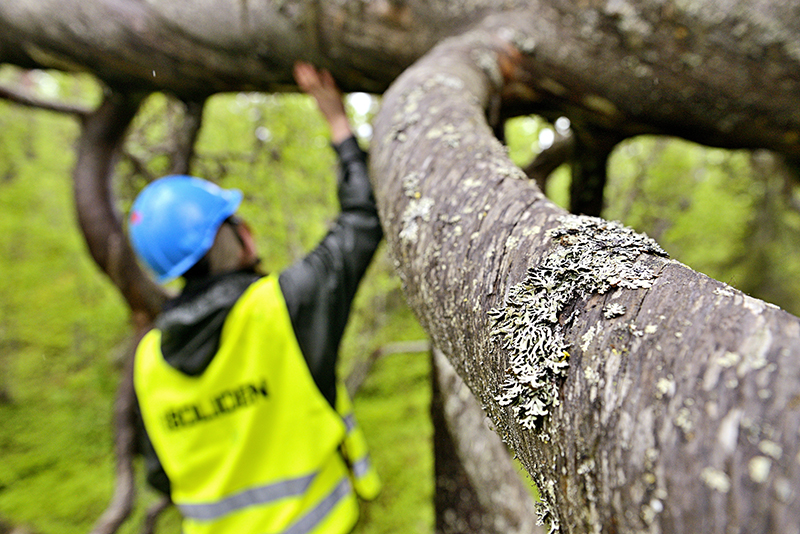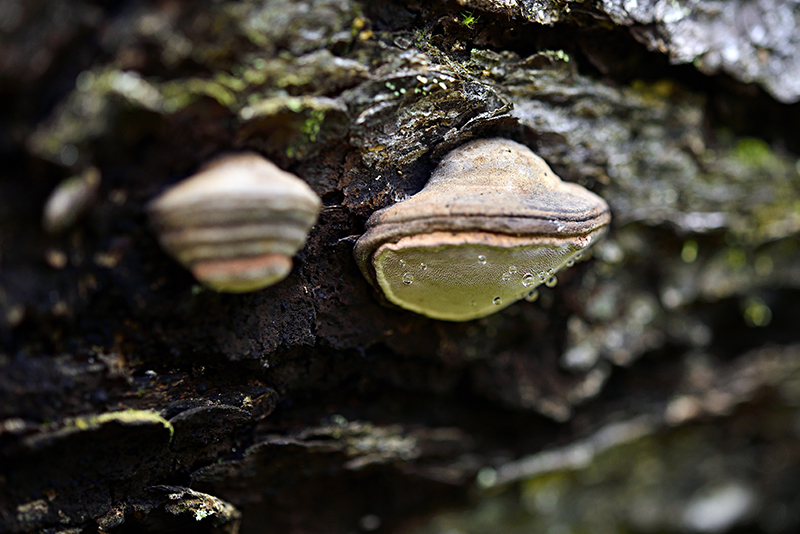Dead wood brings forest to life
Expanding Aitik’s tailings pond requires space. This means
more land must be used for the operation. Aitik’s responsibility
is to minimise this impact as much as possible. Ecological
compensation is one way they achieve this.

“We’re protecting two other areas to compensate for the land we must use for our operation,” says Sofia Lindmark-Burck, environmental coordinator at Aitik’s external environment section.
Expanding the tailings pond means that around 376 hectares of land, of which almost 170 hectares comprise forest with natural values classified as high or very high, will be directly impacted. To make up for this, Boliden proposed compensating the loss of land by protecting and enhancing the natural values in other areas.
“Hopefully, this will be a good way of showing that it’s possible to combine active mining operations with good environmental management,” Sofia says.
However, determining areas for compensation was no easy matter. The supervisory authority, the County Administrative Board, wanted Boliden to protect areas that already had high natural value but that were not yet protected by being nature reserves. This was a proposal that Boliden did not consider to be the best option as it would mean an inevitable loss of forests with high conservation value. “We felt there was added value in minimizing the loss of land by focusing on active measures to create high natural values in areas with the right potential,” says Sofia.
After many long discussions, Boliden and the County Administrative Board agreed on a compensation model. Two areas, in all 840 hectares and far more than the 250-hectare minimum the permit required, were selected near Aitik and in direct connection to Leipipir Ecopark and the Dundret nature reserve.
“The areas were chosen in part because we feel there to be great value in maintaining and increasing natural values in the near vicinity,” she says.
An easement for 50 years was signed with landowners Sveaskog and the Swedish University of Agricultural Sciences (SLU), with the amendment that the County Administrative Board, if it so wishes, may transform the area into a nature reserve free of charge if the measures are considered successful at the end of the agreement.
The compensation plan includes both protection of the selected areas and more active measures, such as the relocation of dead wood and biologically important species such as insects in hibernation and wood mushrooms. The goal is to see if the time it takes to improve the living environment for species and thereby create high natural values can be reduced. The latter is also planned to be the subject of a long-term research project supported by Boliden within the framework of SLU’s forestry research.
“If it works, it can increase biodiversity and improve living conditions or endangered species in much less time than is usually the case today,” says Sofia, adding that she also hopes that it’s not only Boliden and its partners Sveaskog and SLU who would benefit from the experience gained from the project. In fact she hopes that it will not only benefit other companies that may need to provide ecological compensation, but also forestry research in general.

However, it’s not just about finding out the possibilities that exist for speeding up ecological processes, thus improving rich biodiversity. Because of the compensation project, Boliden also sees scope for improving recreational and adventure tourism opportunities for people in the area. Accordingly, there are plans to make parts of the area so-called educational forest, where schools can bring their students for nature studies. In addition, there are also plans to set up barbecue areas, improve signage and otherwise improve access to the area. The Hermelin bridle path, which in the 18th century was used for such things as hauling ore by reindeer sleigh, runs through part of the area. The project includes plans to extend the path towards Dundret and thus creates better opportunities for outdoor recreation.
“I think it’s important to find a balance between ecological benefit and human recreation. We also want the public to be able to use and enjoy the area,” she said.
In the longer term, the project will provide valuable information and research opportunities for ‘green’ forest research, and Sofia is pleased about the commitment that the entire project group shows. “We note a genuine interest within the project group that this is not just something done for show. We really want this to work and make a difference,” said Sofia.
Text: Catrine Johansson-Lantto
Photo: Daniel Olausson